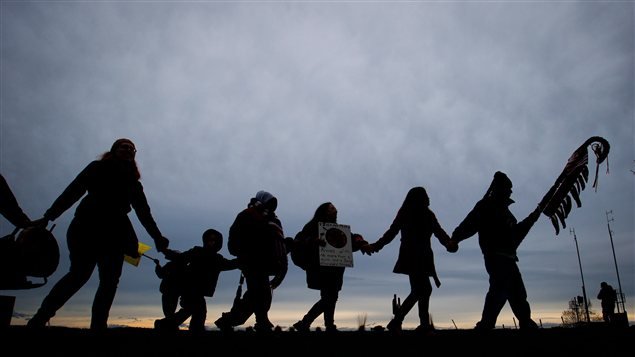This year marks the 250th Anniversary of the signing of the Royal Proclamation between England and the native people of Canada. It is a significant event, one that Canada’s aboriginal people are honoring and celebrating with a planned visit to Buckingham Palace to meet Queen Elisabeth in October. This ceremonial trip, it is hoped, will also bring pressure to bear on Canada to move forward on treaty rights.
Many First Nations rights have been upheld in Supreme Court decisions but the jurisprudence has not yet moved into provincial and local jurisdictions, and conflicts have been heating up in the last year. The high profile hunger strike over the Christmas holidays of Ontario’s Chief Theresa Spence from Attawapiskat was a rallying point. Railway lines were blocked in support and fuelled the growth of the social media campaign, known as “Idle No More” which led to several protest marches and events across Canada.
Chief Perry Bellegarde, the regional chief of Saskatchewan and the Assembly of First Nations treaty expert, hosted a two-day forum in his province last week, to look into the treaty process.
“What we were trying to do last week, was bring all the treaty rights and title holders from across Canada to try to get a small working group so we could start looking at new ideas and new mechanisms for treaty implementation.” – Chief Perry Bellegarde.
Some of the ideas include a framework for dialogue and negotiation, in a new department within government to implement treaty and respect the Canada, First Nations, Crown relations. This nation to nation basis is supported by First Nations’ claims that their agreements are with the Crown, not with Canada.
Establishing a Treaty Commissioner is another suggestion, one who would have the power and authority and mandate to implement treaties and Canada’s constitution which includes Section 35, which recognizes and respects existing aboriginal treaty rights.
Resource revenue sharing is another aspect that Chief Bellegarde says is paramount in a new relationship, a timely development when Canada’s resources are in demand from both the Unites States and China.
The next step is to continue the dialogue that began on January 11th, when Prime Minister Stephen Harper met with a delegation from the Assembly of First Nations, in the growing crisis around Chief Spence’s hunger strike. Perry Bellegarde said the Prime Minister promised to move ahead on new mechanisms treaty implementation. This continued dialogue at the highest level, along with a campaign of education and awareness for all Canadians by First Nations will be part of this significant anniversary year.







For reasons beyond our control, and for an undetermined period of time, our comment section is now closed. However, our social networks remain open to your contributions.